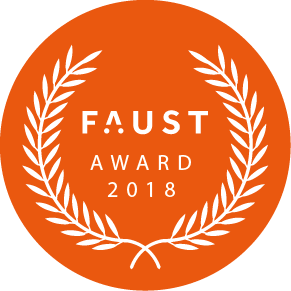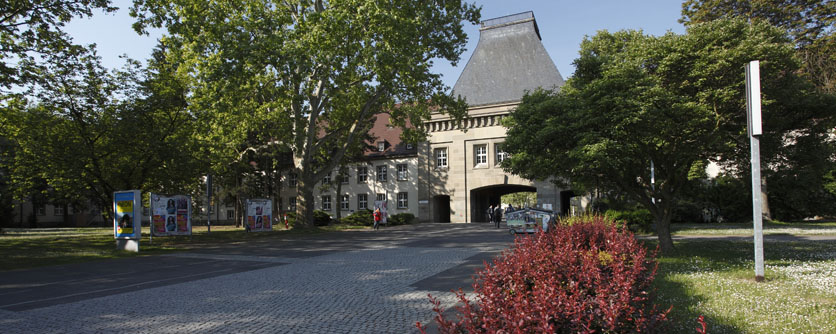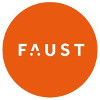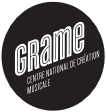The International Faust Conference (IFC-18) took place at the Johannes Gutenberg University of Mainz (Germany) on July 17-18, 2018. It aimed at gathering developers and users of the Faust programming language to present current projects and discuss future directions for Faust and its community.
Participants shared their work through paper presentations. A series of round tables on various topics served as a platform to brainstorm on Faust's features, semantics, tools, applications, etc. to determine future directions for this language. Open spaces for demos and workshops were available for participants to openly share their ongoing projects with the rest of the community.

Presentations Videos
The videos of IFC's presentations can be found on the IFC-18 YouTube channel. Individual links to presentations are also available in the conference program.
2018 Faust Awards
The Faust Open Source Software Competition aims at promoting innovative high-quality free audio software developed with Faust, a functional programming language for realtime signal processing and sound synthesis. The competition is sponsored by GRAME, Centre National de Création Musicale.

The 2018 Faust awards were attributed during the closing ceremony of IFC-18 to iPlug 2 (Oliver Larkin) and Cloud Generator (Rittik Wystup).
More information about the 2018 Faust Awards can be foung on the Faust Website
Pictures
Additional pictures of the conference can be found here.
In the Press...
IFC-18 was featured in various German medias:
- SWR Aktuell Rheinland-Pfalz, Programmiersprache macht digitale Töne
- Deutschlandfunk, Für einen Mathematiker ist das der Himmel
- Deutschlandfunk, Radio-Premiere für die Zarenglocke
Call for Participation
Paper Presentations
We welcome submissions from academic, professional, independent programmers, artists, etc. We solicit original papers centered around the Faust programming language in the following categories:
- Original research
- Technology tutorial
- Artistic project report (e.g., installation, composition, etc.)
Papers should be up to 14 pages in length, non anonymous, and formatted according to this template. Submissions should be carried out via our EasyChair portal.
All submissions are subject to peer review. Acceptance may be conditional upon changes being made to the paper as directed by reviewers.
Accepted papers will be published on-line as well as in the IFC-18 proceedings paper version. They will be presented by their author(s) at IFC-18 as 15 minutes presentations (+ 5 minutes for questions).
Feel free to contact us if you have any question.
Important Dates
- Paper submission deadline: April 2, 2018
March 2, 2018 - Notification of Acceptance: May 5, 2018
May 1, 2018 - Camera-Ready Version: June 1, 2018
Round Table Topics
A series of round tables on the following themes will take place both afternoons of IFC-18:
- Faust Tools (e.g., Architectures, IDE, Faust Code Generator, On-Line Services, etc.)
- DSP in Faust and Faust Libraries (e.g., New Algorithms, New Libraries, Missing Functions, etc.)
- Faust Compiler and Semantics
- Other Topics/Open Session
About
Where & When?
July 17-18, 2018 - JGU (Johannes Gutenberg University), Mainz, Germany.

With about 36,500 students from about 130 nations, Johannes Gutenberg University Mainz (JGU) is one of the ten largest universities in Germany. As the only comprehensive university in Rhineland-Palatinate, JGU combines almost all academic disciplines under one roof, including the Mainz University Medical Center, the School of Music, and the Mainz Academy of Arts, which is a unique feature in the German academic landscape.
The JGU is also one of the oldest universities in Germany. Founded in 1477 during the era of Johannes Gutenberg and reopened after a 150-year break in 1946 by the French forces then based in Germany, Johannes Gutenberg University owes much to the man whose name it bears and his achievements. In keeping with the Gutenberg Spirit, the JGU has set itself the mission of "moving minds and crossing boundaries." Interdisciplinary discourse is therefore a hallmark of this university.
This is also true for the Computer Music Research Group (Bereich Musikinformatik) of the JGU which will host IFC-18. Being founded in 1991, our research group has been among the first German academic institutions in this interdisciplinary field at the intersection of music, mathematics, computer science and media technology. In our media lab students are working almost exclusively with Linux, and in our research we are also devoted to contributing to the growing body of open source audio and computer music software.
Who?
IFC-18 will take place under the auspices of the the IKM (Institut für Kunstgeschichte und Musikwissenschaft) of the JGU and is organized in partnership between the Computer Music Research Group (Bereich Musikinformatik) of the IKM, GRAME - Centre National de Création Musicale (Lyon, France), and the Center for Computer Research in Music and Acoustics (CCRMA) of Stanford University (USA).
Committee
Steering Committee
- Yann Orlarey (GRAME, Lyon, France)
- Albert Gräf (JGU, Mainz, Germany)
- Romain Michon (CCRMA, Stanford University, USA & GRAME, Lyon, France)
- Stéphane Letz (GRAME, Lyon, France)
Scientific Committee
- Albert Gräf (Chair) - Johannes Gutenberg University (Mainz, Germany)
- Romain Michon (Paper Chair) - CCRMA, Stanford University (USA) & GRAME (Lyon, France)
- Yann Orlarey - GRAME (Lyon, France)
- Stéphane Letz - GRAME (Lyon, France)
- Julius Smith - CCRMA, Stanford University (USA)
- Victor Lazzarini - National University of Ireland (Maynooth, Ireland)
- Chris Chafe - CCRMA, Stanford University (USA)
- Pierre Jouvelot - CRI, MINES ParisTech (Paris)
- Bart Brouns - Studio Magnetophon (Netherlands)
- Pierre Lecomte - INSA (Lyon, France)
Program
IFC 2018 Live Stream
Tuesday, July 17
| 09:00 |

 Welcome/Announcements
Welcome/Announcements |
Stefanie Acquavella-Rauch and Albert Gräf |
Session 1: Development
Keynote
| 11:20 |
 Keynote: An Attempt of Faust History
Keynote: An Attempt of Faust History |
Yann Orlarey |
| 12:00 |
 Invited Talk Faust on the Analog Devices SHARC Audio Module
Invited Talk Faust on the Analog Devices SHARC Audio Module |
Julius O. Smith |
Session 2: Architectures
| 12:20 |

 Getting OSC to work better with Faust -- A Proposal //
Getting OSC to work better with Faust -- A Proposal // Notes on Multitimbrality and Temperament
Notes on Multitimbrality and Temperament |
Albert Gräf |
| 12:40 | Lunch |
Round-Table Discussions
| 14:00 | Faust Tools | Chair: Stéphane Letz |
| 15:30 | Coffee Break | |
| 16:00 | DSP in Faust and Faust Libraries | Chair: Romain Michon |
| 17:30 |
Special Event (MIDI Lab, Pfeifferweg 12)
| 14:00 | Faust Student Workshop | Julia Krüger |
Wednesday, July 18
| 09:15 | Announcements | Albert Gräf |
Session 3: Theory and Libraries
Session 4: Applications
Round-Table Discussions
| 14:00 | Faust Compiler and Semantic | Chair: Yann Orlarey |
| 15:30 | Coffee Break | |
| 16:00 | Other Topics/Open Session | Chair: Albert Gräf |
Special Event
| 17:30 | 2018 Faust Award Ceremony | Yann Orlarey |
| Tue. + Wed. |

 chair.audio
chair.audio |
Björn Kessler |
| Wed. |
 Faust Language in the Computer Music Team of the Music
Department in Paris 8 University (
KIWI demo)
Faust Language in the Computer Music Team of the Music
Department in Paris 8 University (
KIWI demo) |
Pierre Guillot, and Alain Bonardi |
Sound Installation (Faculty Room)
| Tue. + Wed. | Ambitools Demo | Pierre Lecomte |
Attend
Registration
Register to IFC-18 for free HERE! WARNING: at this point, we cannot guaranty that registrants will be able to get a free Wifi access at the university in Mainz.
Notes to Presenters
The sound system of the conference room will be accessible through a 3.5mm audio jack. VGA will be used to connect to the projector. Adapters will not be provided: make sure to you bring your own as well as any suitable power adapter (220v, euro plug). The max screen resolution will be 1024*768.
Traveling to Mainz
Remember to check the validity of your passport and any visa requirements you might have to enter the European Union.
Please also check the Directions to Mainz University page for more detailed information, campus maps and various helpful links.
By Air
There are two airports located in the vicinity of Mainz:
- Frankfurt International Airport (FRA)
- Continue your journey to Mainz Main Station by train (EC, ICE, IC, RE, RB) or S-Bahn (line S8)
- Ticket price: About 4€ to 14€ (depending on type of train)
- Travel time: 20 to 40 minutes (depending on type of train)
- For train timetables and further information please check the Deutsche Bahn website.
- Frankfurt-Hahn Airport (HHN)
- Continue your journey to Mainz main station by bus (Airport Shuttle Frankfurt-Hahn)
- At Frankfurt-Hahn airport the ORN bus to Mainz Main Station departs from busstop 17 in front of Terminal A (as of Jan 13th)
- Tickets for the Airport Shuttle are available at the bus or can be booked online at ORN Bus ticket.
- Ticket price: About 5€-13€ (online) or 16€ at the bus
- Travel time: About 75 minutes
- For timetables and further information please check the Airport Shuttle Frankfurt-Hahn to Mainz website.
By Train
The City of Mainz has one central and multiple other train stations. Schedule information is provided by Deutsche Bahn.
By Car
Please check the attached map (PDF) for driving directions to the Johannes Gutenberg University.
From the west (i.e. from direction Bonn/Cologne)
• Travel autobahn A 60 crossing "Autobahn-Dreieck Mainz" direction Darmstadt.
• Leave autobahn A 60 at exit "Mainz-Finthen".
• Follow the street sign "Saarstraße/Innenstadt" straight ahead through the traffic circle "Europaplatz".
• Take exit "Universität".
From the east (i.e. from direction Würzburg/Darmstadt)
• Travel autobahn A 60 crossing "Autobahn-Dreieck Rüsselsheim" OR travel autobahn A 63 crossing "Autobahnkreuz Mainz" to get to autobahn A 60 direction
Bingen.
• Leave autobahn A 60 at exit "Mainz-Finthen".
• Follow the street sign "Saarstraße/Innenstadt" straight ahead through the traffic circle "Europaplatz".
• Take exit "Universität".
From the north (i.e. from direction Kassel)
• Follow autobahn A 66.
• At "Schiersteiner Kreuz" change to autobahn A 643 direction Mainz.
• Follow autobahn A 643 to "Autobahn-Dreieck Mainz" and change here to autobahn A 60 direction Darmstadt.
• Leave autobahn A 60 at exit "Mainz-Finthen".
• Follow the street sign "Saarstraße/Innenstadt" straight ahead through the traffic circle "Europaplatz".
• Take exit "Universität".
Parking on campus is available only with special permission. Please see the site map (pdf) for parking in the nearest vicinity of the campus. Parking is also available at the near-by football stadium, which is about 200 meters from the University’s main entrance.
By public transportation
The easiest way to get to the Johannes-Gutenberg Campus is to take one of the following tram or bus lines from Mainz Main Station ("Hauptbahnhof"):
Tram lines:
- Line 51 (towards Lerchenberg)
- Line 53 (towards Lerchenberg)
Bus lines:
- Line 6 (towards Münchfeld/Gonsenheim)
- Line 54 (towards Klein-Winternheim)
- Line 55 (towards Finthen)
- Line 56 (towards Finthen/Wackernheim)
- Line 57 (towards Bretzenheim)
- Line 59 (towards Hochschule Mainz)
- Line 64 (towards Hartenberg)
- Line 65 (towards Hartenberg)
- Line 68 (towards Budenheim)
- Line 75 (towards Schwabenheim/Ingelheim)
- Line 90 (towards Finthen)
- Line 91 (towards Lerchenberg)
- Line 650 (towards Sprendlingen)
We would recommend using the tram lines 51 or 53 which both stop directly at the main entrance to the campus, but also at the station "Friedrich-von-Pfeiffer-Weg", which is the nearest stop to the Philosophicum where the conference takes place. This is also close to the MIDI Lab where the Workshop is being held.
Street and Mailing address:
|
Johannes Gutenberg-Universität IKM - Abteilung Musikwissenschaft Jakob-Welder-Weg 18 (Philosophicum) 55128 Mainz Germany |
Linux Audio Conference 2015 c/o Johannes Gutenberg-Universität IKM - Abteilung Musikwissenschaft 55099 Mainz Germany |
Map
View Larger Map on Google Maps
Staying in Mainz
Hotels
The following hotel offers a limited contingent of rooms for conference participants, valid until March 2018. Please use the given password for your room reservation.
Hotel Römerstein Draiserstraße 136f. Take a look at the Booking website for the price information. (password: FAUST)
Misc Hotels and B&B
- Bed and Breakfast
- Also see here (Google).
Hostels
For those who prefer a cheaper option:
Please note we store and process your personal information solely for the purpose of preparing IFC18, specifically: (1) Counting the number of prospective attendants, (2) providing badges and free WLAN accounts to all attendants. You personal data will *not* be used for any other purposes.
© IFC-18





